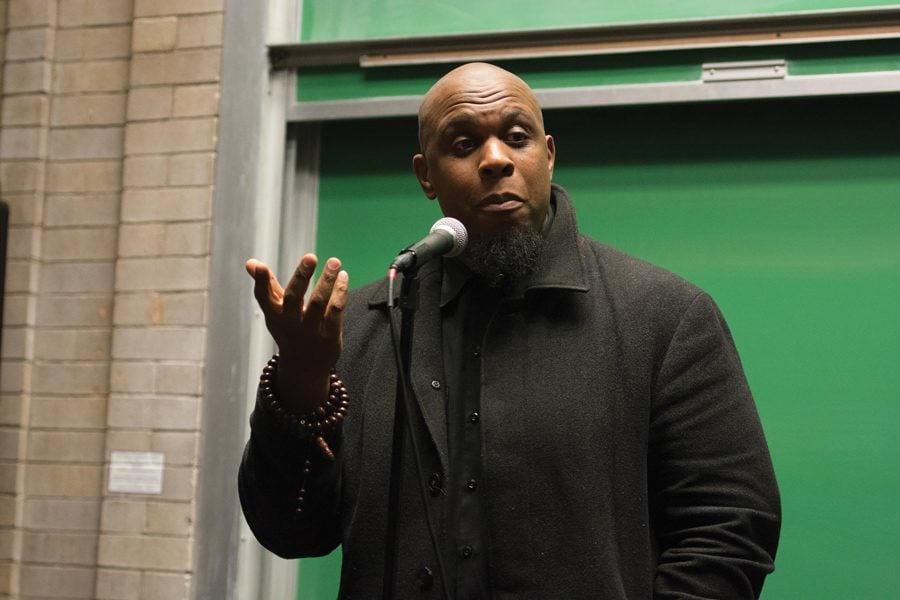Poet Amir Sulaiman discusses cultural power of poetry
Oreste Visentini/The Daily Northwestern
Amir Sulaiman discusses poetry in Swift Hall. Sulaiman spoke as part of the Muslim-cultural Students Association’s Fall Concert.
November 20, 2017
While listening to Lauryn Hill’s hip hop music in the late 90s, Amir Sulaiman — a poet known for combining love, race and religion in his work — said he was surprised by its evocative style, which prompted him toward “mastering poetry.”
“Everything of me comes from poetry,” Sulaiman said. “In the first place I’m a poet and then from poet I became a performer, a screenwriter and an activist.”
Sulaiman recounted the development of his passion for poetry and its social implications at the Muslim-cultural Students Association’s Fall Concert on Thursday. About 30 people attended the event in Swift Hall, which began with a Qur’an recitation performed by two Northwestern students. Sulaiman then read his poems and shared their meanings.
Eager to learn more about expressing himself through storytelling at a young age, Sulaiman started to explore different realms of poetry — from Langston Hughes to Sufi poetry, he said.
“Since then, I’ve been living all of it up and metabolizing it into what you see now,” Sulaiman said.
As a black Muslim man born and raised in the U.S., Sulaiman said he was repeatedly questioned about his “true origin.”
In response, Sulaiman said he adopted poetry to communicate his feelings with the public and challenge stereotypes. At Thursday’s event, he encouraged the audience to engage more in the community to combat cultural misunderstandings.
“Everyone who lives in the city of knowledge is an immigrant from the city of ignorance … so we have to engage with each other even though it is challenging for a great amount of people,” Sulaiman said.
McCormick junior Ayesha Rahman, director of public relations of McSA, told The Daily the event was geared toward all students, regardless of their religion.
“For the Muslim students on campus, we hope to give them new perspectives on their own faith,” Rahman said. “As for the non-Muslim students, we enable them to learn about Islam through the medium of poetry, instead of just stating facts to them.”
She added that the event served as a “beautiful” way to introduce Islamic culture to students with different cultural backgrounds.
Sulaiman said poetry functions as the most effective means to engage community members, transcending discussions that often revolve around “lengthy Facebook comment threads.”
“The representation by poems is more natural and more organic and more unifying than it is to have political powers because it is not as strong as cultural powers,” Sulaiman said.
Weinberg junior Fidak Khan said she appreciated that the group invited a speaker whose understanding of the world crosses the boundaries of Islam.
“I agree that poetry and cultural things sometimes have more power because they can touch your heart, whereas legislation and politics might be very contentious,” Khan said. “But I think you need both because (poetry) touches one’s heart and (political power) has more direct power in people’s lives.”
Email: limingwan2021@u.northwestern.edu
Twitter: @piuadrianw



